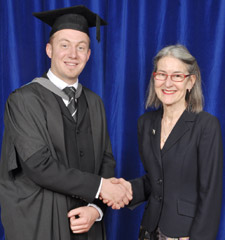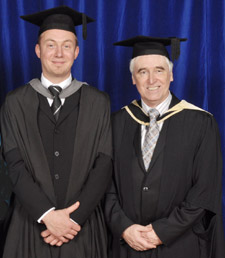Masters course engineers bright future for first graduate
Posted Thursday 17 February 2011
 With university tuition fees set to rise dramatically in 2012, studying for a first degree is likely to be a difficult enough financial choice for students, so deciding to take time away from work to do an MSc is going to be an even tougher decision. Now though, professional engineers are able to achieve an MSc which counts towards Chartered Engineer (CEng) status without having to give up their jobs - thanks to a new Kingston University Masters degree programme.
With university tuition fees set to rise dramatically in 2012, studying for a first degree is likely to be a difficult enough financial choice for students, so deciding to take time away from work to do an MSc is going to be an even tougher decision. Now though, professional engineers are able to achieve an MSc which counts towards Chartered Engineer (CEng) status without having to give up their jobs - thanks to a new Kingston University Masters degree programme.
Dean Carran, who originally graduated from Kingston in 2006 with a degree in aerospace engineering, became the first graduate of the MSc Professional Engineering programme when he picked up his certificate at a presentation ceremony held at the Rose Theatre in Kingston on Tuesday 25 January. The work-based MSc is part of the Engineering Gateways initiative launched in 2006 by the Engineering Council in collaboration with four universities, led by Kingston.
After achieving his degree, Dean set up his own engineering consultancy business in Kingston town centre and was initially, he said, just focused on getting it off the ground. "As my business grew and developed, though, I realised that there was a definite benefit in being recognised as a chartered engineer within the aerospace industry," he explained. "I couldn't afford the time to go back to university full or even part-time to get the academic qualifications that would lead to chartered status though, so the work-based postgraduate degree at Kingston seemed ideal as it let me build my Masters modules around my day-to-day work. It's been a real benefit to both me personally and my company."
 Mike Hope, leader of work-based learning at Kingston's Faculty of Engineering said Dean had made good use of his Masters programme both to enhance his own engineering learning and to boost his business, JNDC. "For engineering companies, having staff with chartered status is important because this demonstrates the industry gold standard to their clients and denotes a high level of knowledge and experience," he said. For individuals, too, being a CEng means that their professional competence is recognised, which greatly adds to their employability in the workforce. "The new programme enables engineers to structure their MSc learning round the professional engineering tasks they undertake at work, without the disruption of time away from their company. In turn, this helps to attract people to the profession who might otherwise not have achieved professional status," Mr Hope said.
Mike Hope, leader of work-based learning at Kingston's Faculty of Engineering said Dean had made good use of his Masters programme both to enhance his own engineering learning and to boost his business, JNDC. "For engineering companies, having staff with chartered status is important because this demonstrates the industry gold standard to their clients and denotes a high level of knowledge and experience," he said. For individuals, too, being a CEng means that their professional competence is recognised, which greatly adds to their employability in the workforce. "The new programme enables engineers to structure their MSc learning round the professional engineering tasks they undertake at work, without the disruption of time away from their company. In turn, this helps to attract people to the profession who might otherwise not have achieved professional status," Mr Hope said.
The Institution of Mechanical Engineers had already confirmed that Dean's MSc would provide him with the academic requirement for CEng registration. This, alongside the competences he has acquired through work, enables Dean to apply to IMechE for the CEng professional qualification, using work from his MSc to demonstrate some of the required competences.
Jon Prichard, Chief Executive Officer at the Engineering Council said: "We would like to congratulate Dean on being the first graduate of the MSc in Professional Engineering, and hope that he is the first of many. The Engineering Council has been very pleased with the take up of these degree programmes and has received positive feedback from students, employers, universities and the professional engineering institutions involved."
The new flexible pathways provide learning through work-based activities and projects, with individuals also able to access university resources electronically. Employers have welcomed the new pathway, in particular its flexible nature, which tackles issues and barriers faced by engineers seeking to enter the professions through higher education.
More than 70 individuals in a range of companies are now enrolled on the MSc Professional Engineering programmes at five higher education institutions, with numbers set to grow. Twelve professional engineering institutions have now signed up to support these programmes.
Contact us
General enquiries:
Journalists only:
- Communications team
Tel: +44 (0)20 8417 3034
Email us



